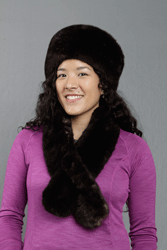Sealaska Heritage Institute will sponsor skin-sewing workshops in six communities in an effort to revitalize a traditional art form and to create a cottage industry in Southeast Alaska.
Through the program, called the Southeast Alaska Sustainable Arts Project, students in Kake, Sitka, Prince of Wales Island, Hoonah, Juneau and Yakutat will learn to stretch hides, cut patterns and hand-sew hats and scarves from furs. The first class is scheduled next week in Kake and the workshops are open to everyone.
One of the goals is to build a cottage industry in economically depressed areas, said Sealaska Heritage Institute President Rosita Worl.
“At Sealaska Heritage Institute what we’re saying is ‘How did individuals earn their income in the past?’ So we looked at those villages where we know that we have first of all a large Native population and secondly they have the resources that are available to them there,” Worl said.
Some villages in the region are so economically depressed, residents have relocated to Juneau in recent years, said Worl, noting SHI included a workshop in the capital city in hopes of training people who might return to their village one day.
The project builds on a program sponsored by the organization nine years ago in Hoonah, where the institute operated a three-year basketry-weaving program taught by master weaver Delores Churchill. At the time, the ancient practice of spruce-root weaving was endangered, but through the program 20 women learned to weave. Some of the women are now teaching others to weave and making income through sales of their work.
Sealaska Heritage Institute has since expanded the program to include workshops on how to make moccasins, which was another old art practice that was in danger of being lost. So far, SHI has taught about 90 students to make moccasins and some of those students also are selling their work.
“So we have a cultural tradition we’ve revitalized but we also have the ability for individuals to earn some income,” Worl said.
The first workshop is scheduled March 7-10 in Kake and will be taught by Shaadoo’tlaa (Lorene Hanlon) (Schedule by Community).
Students will learn to make a pill box-style hat or a hunter’s-style hat and a keyhole scarf from sea otter fur. Applicants who are not eligible for the class under the Marine Mammal Protection Act can bring an alternate material.
There is a $50 fee to cover the cost of materials, but students may also pay for the class by donating one of their items to Sealaska Heritage Institute. Students will spend the first day learning to stretch hides, the second day cutting patterns and the last two days hand sewing their products. To register, contact Shaadoo’tlaa at lorene.hanlon (at) sealaska (dot) com or (907) 586-9129.
The project is funded mostly through a three-year grant from the State of Alaska.
Sealaska Heritage Institute was founded in 1980 to promote cultural diversity and cross-cultural understanding. The institute is governed by a Board of Trustees and guided by a Council of Traditional Scholars. Its mission is to perpetuate and enhance Tlingit, Haida, and Tsimshian cultures of Southeast Alaska.





